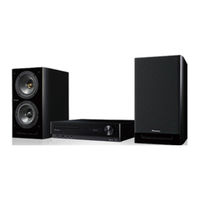Pioneer ELITE S-Z9 Manuels
Manuels et Guides d'utilisation pour Pioneer ELITE S-Z9. Nous avons 1 Pioneer ELITE S-Z9 manuel disponible en téléchargement PDF gratuit: Mode D'emploi
Pioneer ELITE S-Z9 Mode D'emploi (92 pages)
Marque: Pioneer
|
Catégorie: Systèmes de haut-parleurs
|
Taille: 2.51 MB
Table des Matières
Publicité
Publicité
